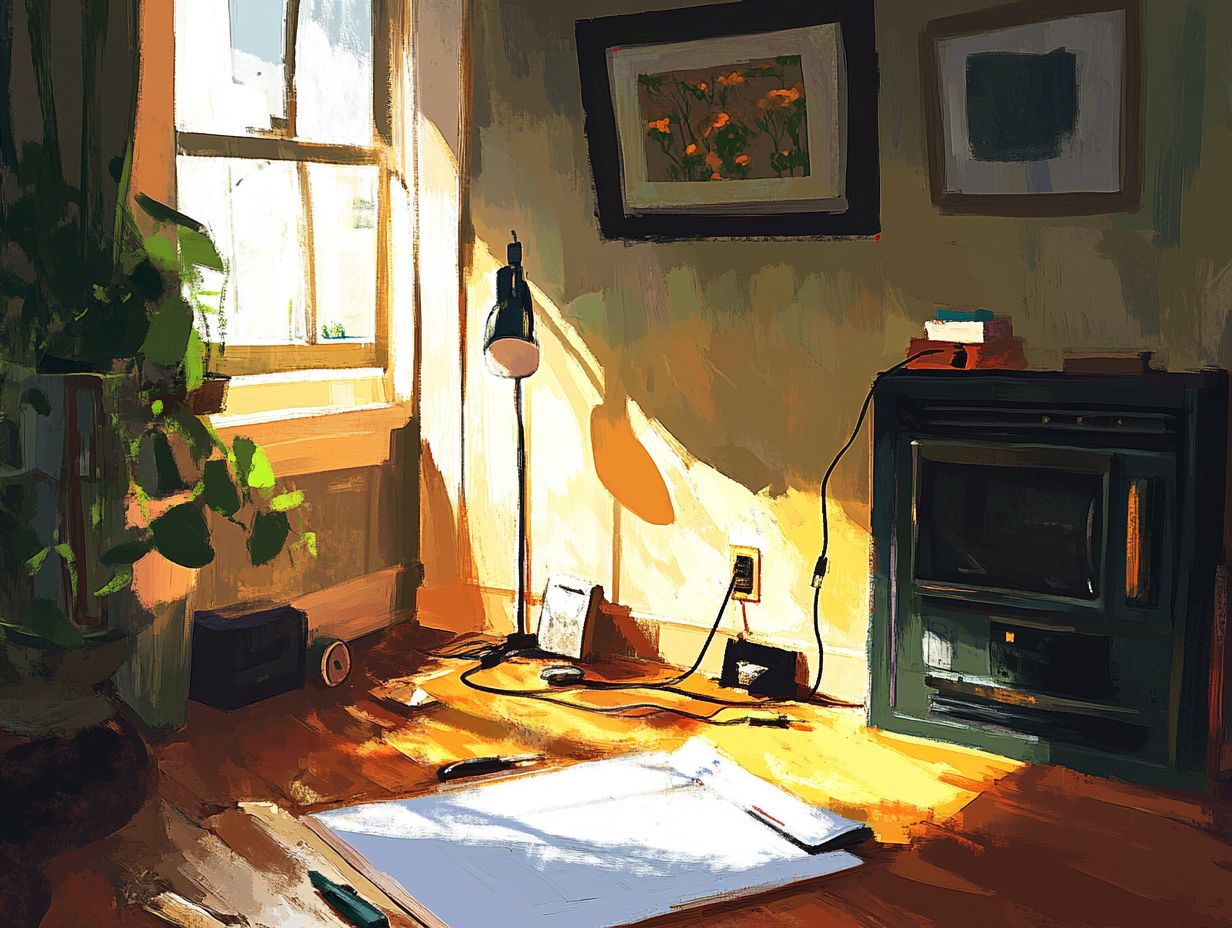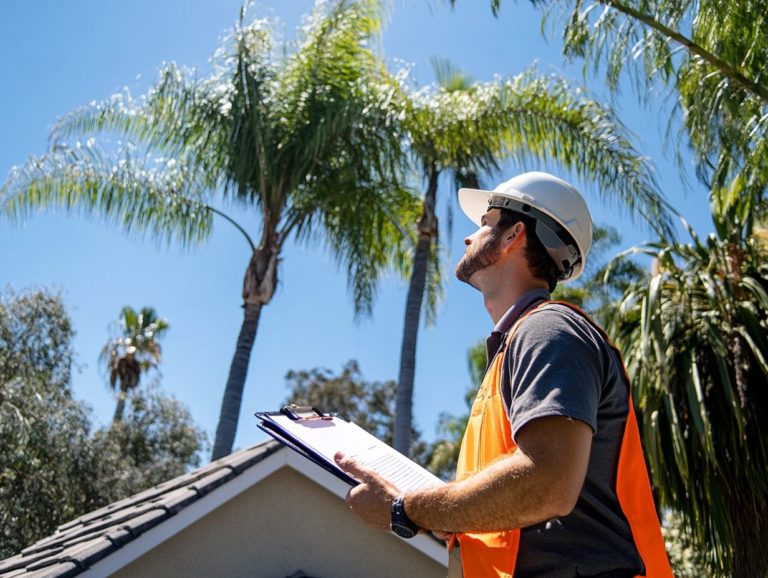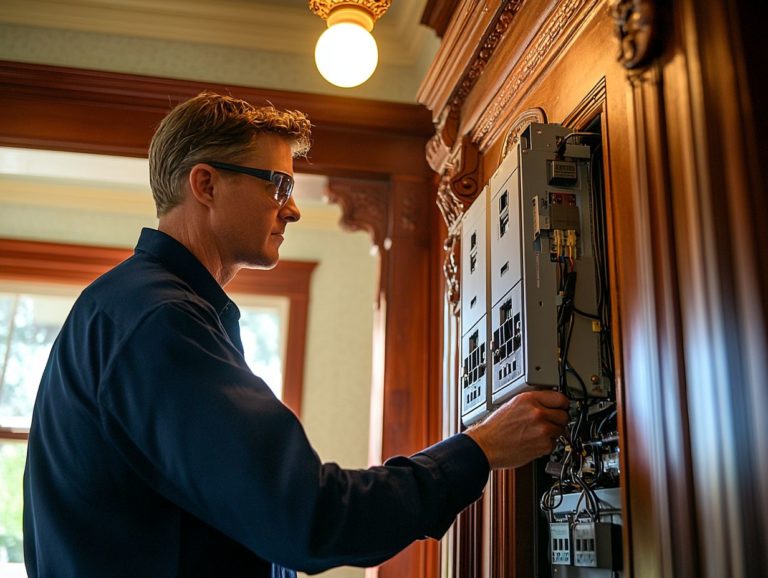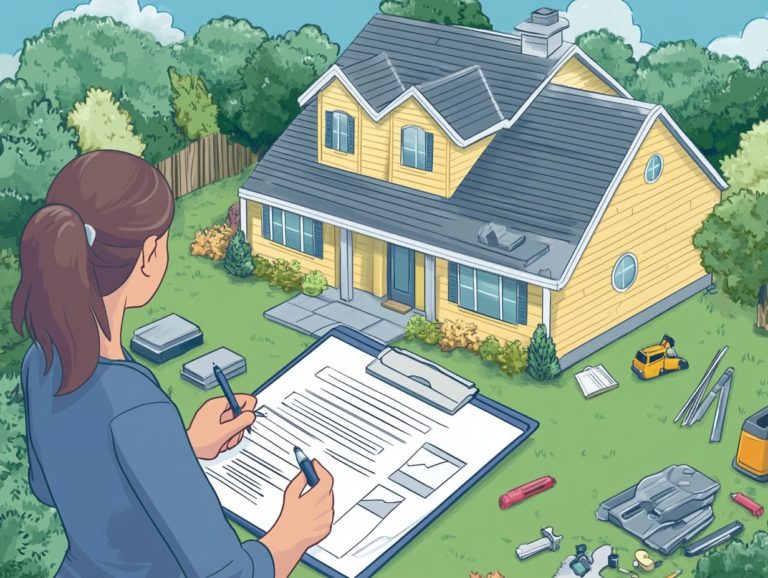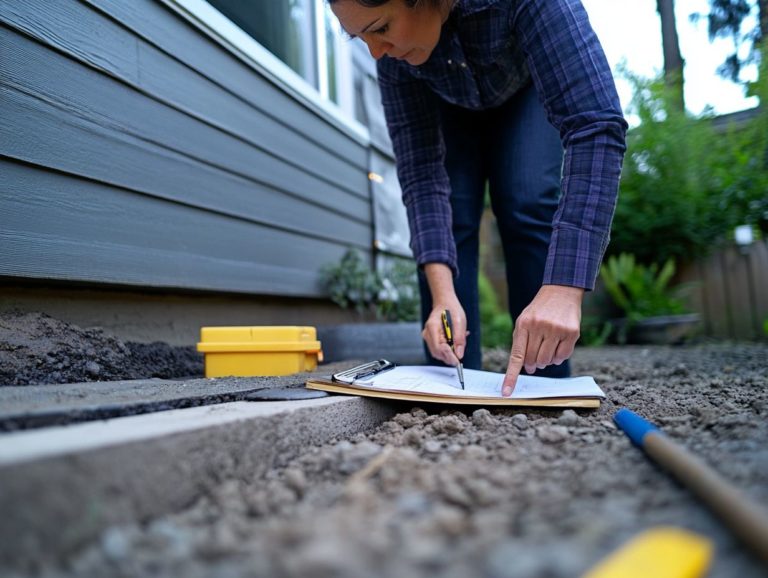Understanding the Home Inspection Process for Buyers
Buying a home stands as one of the most significant investments you ll ever make. Ensuring it s a sound choice is absolutely vital.
Home inspections are key to this process. They reveal potential issues and empower you to make informed decisions.
This article will guide you through what to expect during a home inspection. It will highlight common issues to watch for, offer tips on selecting a reliable inspector, and provide strategies for negotiating repairs.
Whether you re a first-time buyer or considering an older property, grasping the home inspection process is essential for protecting your investment.
Contents
Key Takeaways:
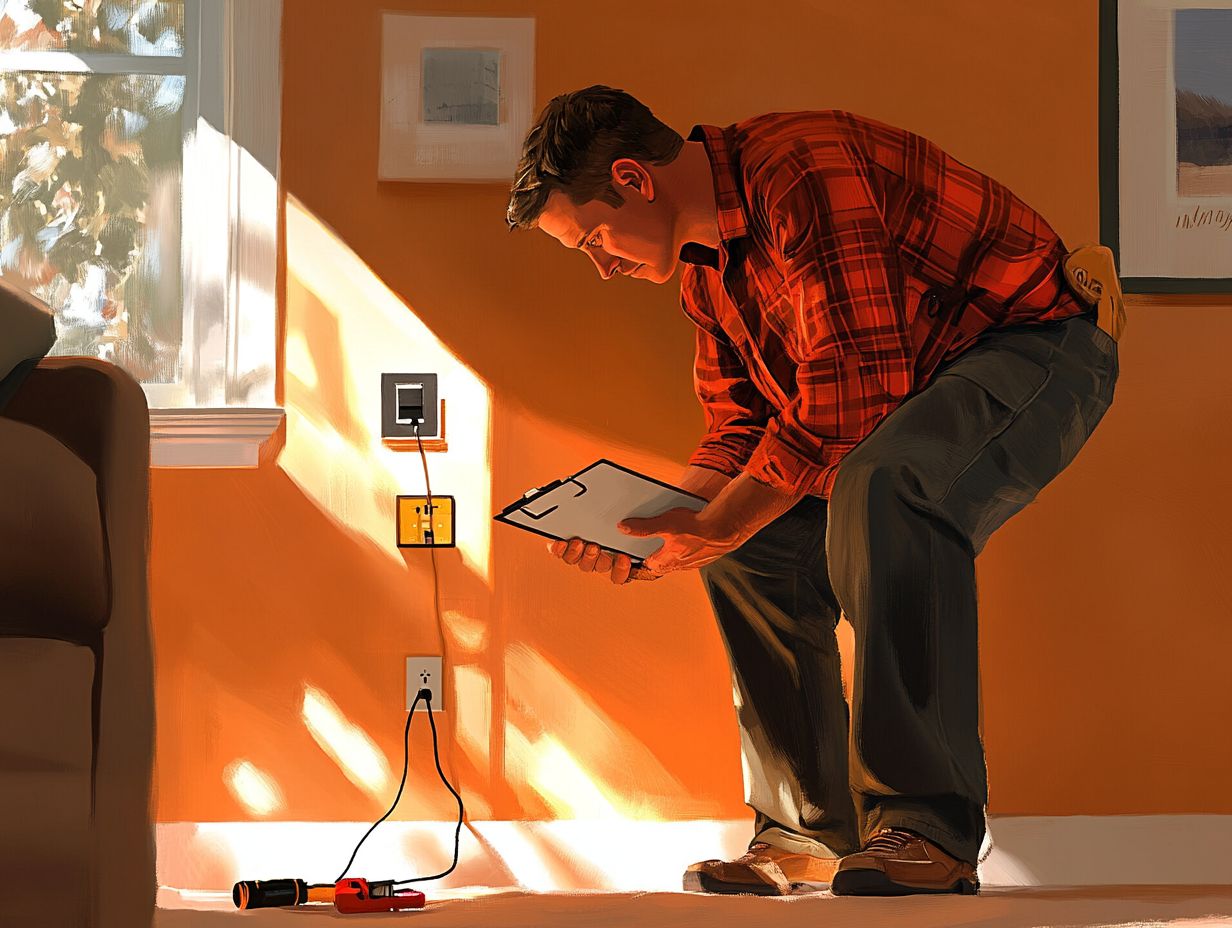
Home inspections help buyers understand a property’s condition, so they can make smart decisions.
During a home inspection, buyers can expect a thorough examination of the property, including its structural elements, systems, and potential issues, which is detailed in the home inspection process.
When choosing a home inspector, consider their experience, qualifications, and reputation.
After the inspection, buyers can negotiate repairs with the seller to address any identified issues.
The Importance of Home Inspections for Buyers
Home inspections are critical in the home buying journey. They offer you crucial insights into the property’s condition and illuminate potential issues, such as structural concerns or aging electrical systems. For sellers, understanding the home inspection process can be invaluable.
By engaging a certified inspector, you ensure a careful look at the property, encompassing an assessment of major defects, plumbing complications, and safety matters that could impact your investment.
A detailed inspection report enhances your negotiating power as a buyer. It also equips agents and sellers with the necessary information to disclose prior to closing.
Why Home Inspections are Necessary
Home inspections are essential for you as a buyer. They offer a thorough evaluation that pinpoints necessary repairs and assesses the overall maintenance needs of a property, highlighting the importance of home inspections.
Without these assessments, you risk overlooking significant safety concerns that could jeopardize your family’s well-being.
By identifying and addressing these issues early, you can sidestep the financial strain of costly repairs after your purchase.
Utilizing a comprehensive inspection checklist ensures you don’t miss any vital elements, allowing for careful evaluations of roofs, plumbing, electrical systems, and beyond.
This proactive approach protects your investment and elevates the overall comfort and security of your home.
What to Expect During a Home Inspection
During a home inspection, you can expect a thorough evaluation of the property carried out by a certified inspector. This process usually spans a few hours and culminates in a comprehensive inspection report detailing the findings, which is outlined in the home inspection timeline.
Expect a careful assessment of major systems, including plumbing, electrical, heating, and cooling. Here s what to expect from the duration of the inspection to the delivery of the final report.
Step-by-Step Process
The step-by-step process of a home inspection begins with scheduling the inspection and preparing the property. Then, you’ll witness a thorough visual examination of all accessible areas, including the roof, foundation, and essential systems like Heating, Ventilation, and Air Conditioning (HVAC). For more details, refer to understanding the home inspection process.
During this phase, the inspector evaluates various elements, such as plumbing, electrical systems, insulation, and windows, documenting any defects that could impact safety or functionality.
An inspection checklist is a critical tool in this process. It guides the inspector through a systematic evaluation and ensures that no significant areas are overlooked.
As a buyer, you gain invaluable insight from the outcomes of these assessments. They highlight potential repair needs and future maintenance costs, significantly influencing your decision-making process regarding the purchase.
Ultimately, a comprehensive inspection fosters transparency and confidence, benefiting both you and the seller in the long run.
Take the first step in protecting your investment today by scheduling a home inspection!
Common Issues Found During Home Inspections
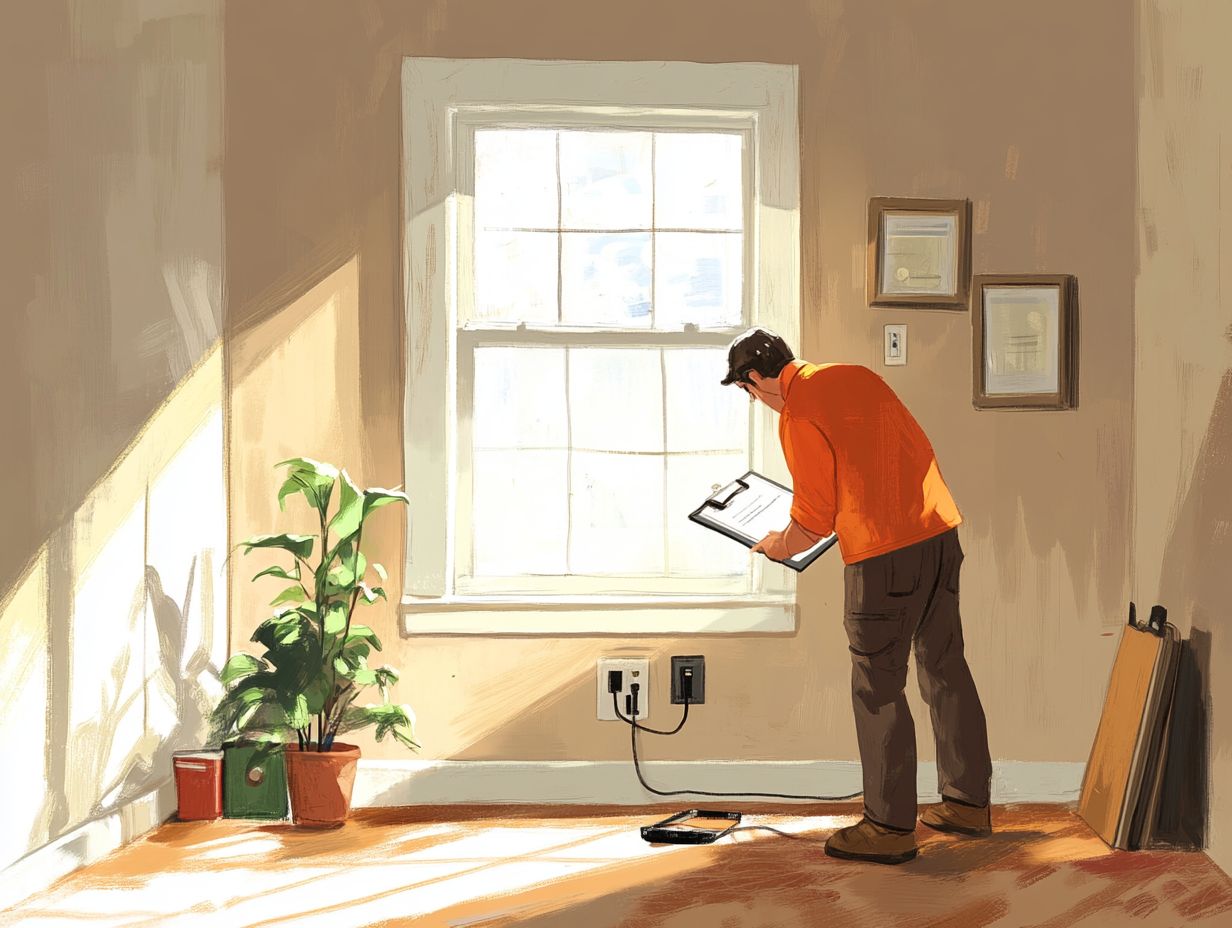
Home inspections frequently uncover issues that can profoundly affect both the value and safety of a property.
Be particularly vigilant about major defects in plumbing and electrical systems, as well as structural concerns like foundation problems and roof damage.
Recognizing these potential red flags is essential for making well-informed decisions regarding your investment.
Potential Red Flags for Buyers
As a buyer, look for potential red flags during a home inspection. Serious defects, like extensive structural issues and plumbing problems, can signal costly repairs lurking just around the corner.
These problems create immediate safety hazards and can substantially reduce the property’s market value over time. For example, signs of water damage or outdated electrical systems could suggest deeper issues that require significant financial commitment to fix.
Mold growth and pest infestations can pose health risks for future occupants. Stay vigilant and carefully check for these red flags; they can dramatically impact the overall condition and livability of the property.
Addressing them upfront is crucial to ensuring a sound investment for your future.
How to Choose a Home Inspector
Selecting the right home inspector is key to securing a comprehensive assessment of your property.
As a prospective buyer, seek out certified inspectors with strong qualifications and substantial industry experience.
Review their past inspection results, customer testimonials, and commitment to inspection standards to ensure a smooth and successful process.
Factors to Consider
When selecting a home inspector, consider several key factors: their qualifications, adherence to inspection standards, and inspection fees, which can vary significantly.
Assess the inspector’s experience; seasoned professionals often have extensive knowledge about local building codes and common issues specific to your area.
Checking for certifications from recognized organizations is important, as these attest to the inspector’s expertise.
The quality and detail of the inspection report are crucial; a comprehensive document that clearly outlines findings can greatly assist you in making informed decisions.
Additionally, seeking referrals or reading online reviews can provide valuable insights into each inspector’s reliability and thoroughness.
Negotiating Repairs After a Home Inspection
Negotiating repairs after a home inspection is your chance to secure the best deal. As a buyer, you can leverage the inspection findings to request necessary repairs or credits from the seller.
Familiarizing yourself with seller disclosure laws which require sellers to disclose known issues about the property and understanding the implications of inspection contingencies conditions that must be met for the sale to go through can enhance your position during negotiations.
This knowledge gives you the power to advocate effectively for repairs that ensure your new home meets your standards.
Tips for Negotiating with Sellers

When negotiating with sellers, stay calm and prepared. Use your inspection findings to support requests for repairs or price adjustments. A well-structured approach can dramatically influence the outcome.
Start by collecting comprehensive data from the seller s disclosure documents, which often reveal critical insights into the property’s condition. Engaging in open dialogue instead of making demands creates a collaborative atmosphere.
Express your appreciation for the property while addressing concerns raised in the inspection report. Present repair requests item by item; this clarifies your position and showcases your respectful demeanor.
Equipped with insights from local market trends, strengthen your negotiation stance to ensure your proposals are reasonable and justified.
Additional Considerations for Older Homes
When considering the purchase of an older home, you will encounter distinct challenges that make a comprehensive home inspection essential.
This process helps you uncover structural issues and identify maintenance needs that often accompany older properties.
Investing time and effort in this inspection can safeguard your investment and ensure you re fully aware of what lies ahead.
Unique Challenges and Precautions
Older homes can present unique challenges during a home inspection. It is essential to evaluate potential structural issues and safety concerns carefully to ensure you re well-informed as a buyer.
These properties often show signs of wear and tear. This can hint at underlying problems that aren t immediately visible. Be particularly cautious about outdated electrical systems, aging plumbing, and harmful materials like lead paint.
Issues such as settling foundations, roof leaks, and pest infestations can seriously compromise both safety and property value.
Inspectors must focus on the integrity of walls and ceilings and the condition of the basement or crawl space. The findings from this inspection will help you understand the current state of the property and the potential costs tied to necessary repairs or renovations.
Frequently Asked Questions
What is a home inspection and why is it important for buyers?
A home inspection is a thorough evaluation of a property’s condition, conducted by a professional home inspector. Understanding the process of home inspections is important for buyers because it can uncover potential issues or defects in the home that they may not have noticed. This allows them to make informed decisions before purchasing the property.
Who typically pays for the home inspection?
In most cases, the buyer is responsible for paying for the home inspection. However, it is always negotiable and may be covered by the seller or split between both parties depending on the sale terms.
What does a home inspection cover?
A home inspection covers the major systems and components of a property, including the roof, foundation, plumbing, electrical, and heating and cooling systems. It checks both the inside and outside of the house.
Should buyers attend the home inspection?
Don’t miss the chance to attend your home inspection! It’s your opportunity to ask questions, learn about the home’s condition, and observe any issues firsthand. This experience helps you better understand the need for home inspections and the written report provided by the inspector.
What happens if the home inspection reveals issues?
If the home inspection uncovers issues or defects, the buyer can request that the seller make repairs or negotiate for a lower price. If the seller is not willing to do either, the buyer can choose to back out of the sale without penalty, as long as they included an inspection contingency in their offer.
Can a home inspection be waived?
Technically, a home inspection can be waived by the buyer, but it is not recommended. Waiving a home inspection means taking on all potential risks and issues with the property without any professional evaluation. It is always better to have a home inspection to ensure the property is in good condition before making such a major purchase.

